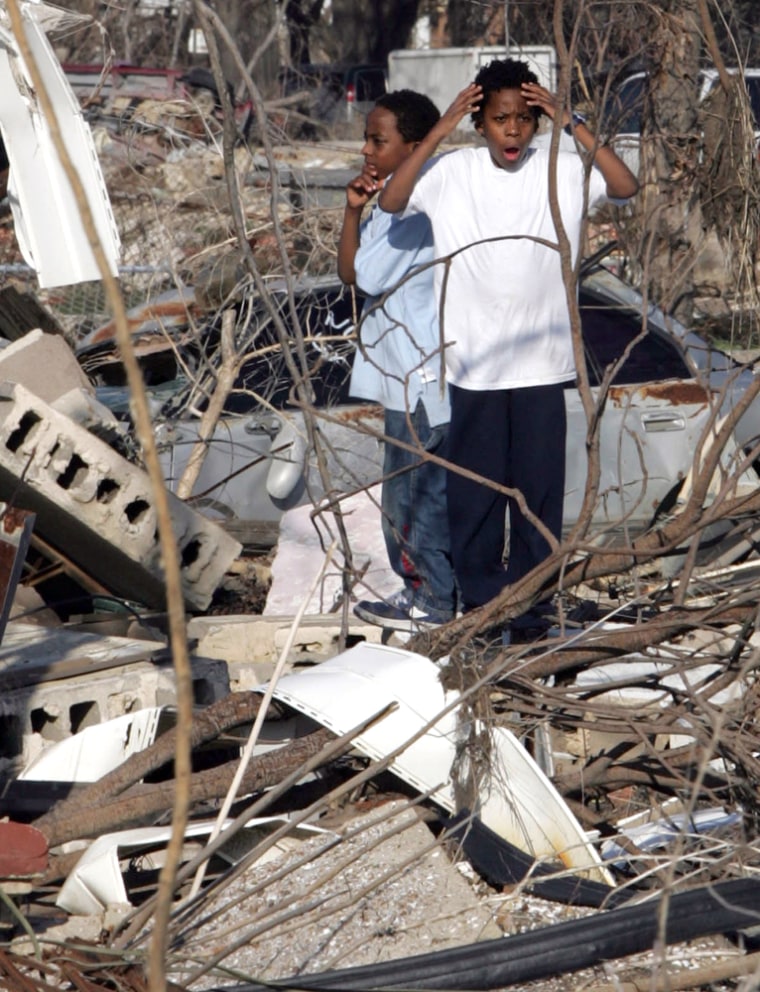Up to a third of those who lived through the death and destruction of Hurricane Katrina may be suffering from post-traumatic stress disorder and cannot find treatment, mental health professionals said Wednesday.
Symptoms of the syndrome, known as PTSD during the Vietnam War but first recorded during the Civil War, include insomnia, nightmares, flashbacks, estrangement and attempted suicides.
Experts say its victims and those with more serious mental health distress like schizophrenia and bipolar disorder are going untreated because of the battered health care system.
“We’re in a real crisis situation where many times people are being turned away at the door,” said Jackie Robinson, medical director for mental health at Metropolitan Human Services District, a state-funded service agency.
Six months after Hurricane Katrina bore down on this city killing more than 1,300 people along the Gulf Coast, just 10 psychiatric patient beds in local hospitals are staffed.
For the most serious mental illnesses, doctors are referring patients to be committed to psychiatric units at a rate of one per day, according to Robinson.
However, there are so few places to put them that they end up in emergency rooms, further clogging the already strained post-Katrina hospital system, or stay untreated altogether.
Hospitals in the city are just starting to reopen emergency rooms, at a fraction of their former services. Three of the former nine city psychiatric clinics are open.
“Their support system has been completely removed,” said Sarah Hoffpauir, a social worker at the Greater New Orleans Mental Health and Resilience Task Force. “Our biggest concern right now are the psychotic, suicidal and gravely disabled.”
Calls to city suicide hotlines have doubled from pre-Katrina levels despite the fact that the city’s population is about a third of its former size, Hoffpauir said.
With PTSD, victims relive painful events in nightmares, flashbacks and other vivid memories. They are unable to move past them, suffering from combinations of grief, depression, avoidance and substance abuse, among other symptoms.
“Up to 30 percent of people exposed to a life-threatening event develop” PTSD, according to Michael Scheeringa, a Tulane University child psychiatrist.
First responders to the crisis — police and emergency workers and others in the front line of recovery efforts — are especially at risk of PTSD, experts said. The poverty-stricken and children generally are also more vulnerable.
Red tape
The state asked Tulane University to come up with a post-Katrina mental health treatment plan, which it did in October, Scheeringa said. “It hasn’t been funded,” he added.
On top of staff and clinic shortages, red tape is hindering treatment. A key problem is that much of the federal money for mental health from the Federal Emergency Management Agency is not allowed to be used for treatment, but only for referral.
“It’s a referral program, but where are they referring people too? Providers have been wiped out,” Scheeringa said.
Also, private care providers in New Orleans are not qualified to receive funds from Medicaid — the federal health insurance program for the poor — if they did not provide care for Medicaid patients before the storm.
“There is no reason to wait. With 9/11 people didn’t get treatment for two and a half years” and many suffered because of it, Scheeringa said.
